News
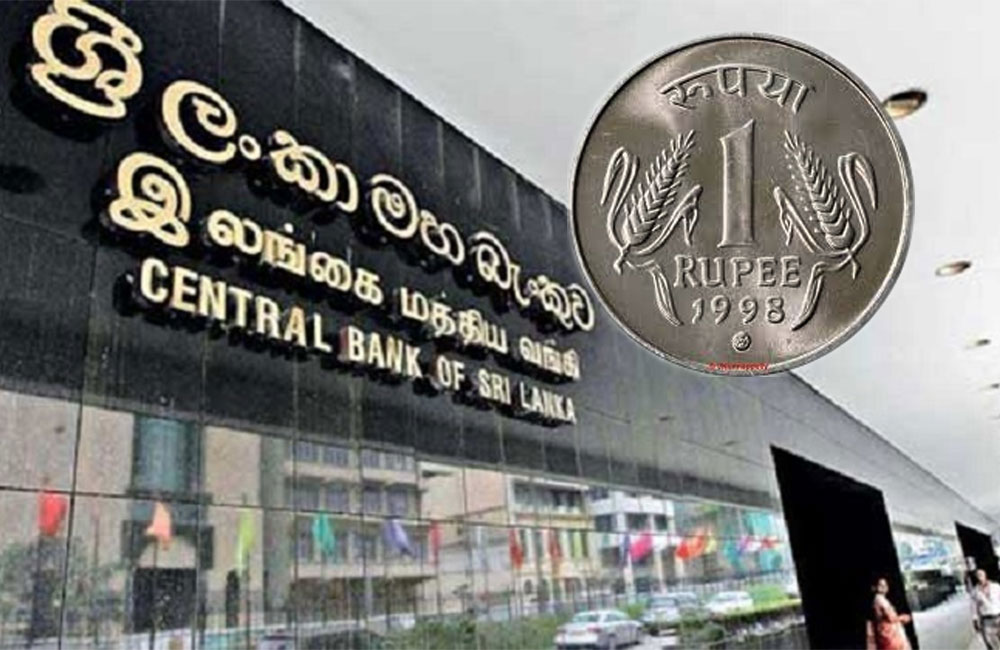
CBSL issues clarification on Indian Rupee
The Central Bank of Sri Lanka (CBSL) issued a statement on Wednesday (2) to clarify certain misrepresentations of facts currently circulating in the public domain on Indian Rupee (INR).
CBSL from time to time, authorises selected foreign currencies as designated foreign currencies with a view to facilitating international trade and cross-border banking transactions.
Commencing May 1979, CBSL has occasionally recognised designated foreign currencies. Currently, following16 currencies have been authorised as designated foreign currencies under the provisions of the Banking Act and the Foreign Exchange Act, with the latest inclusion being the INR in August 2022.
List of designated foreign currencies
Australian Dollar Canadian Dollar Chinese Renminbi Danish Kroner Euro Hongkong Dollar Indian Rupee Japanese Yen New Zealand Dollar Norwegian Kroner Pound Sterling Singapore Dollar Swedish Kroner Swiss Franc Thai Baht United States Dollar
The main purpose of authorising foreign currencies as designated foreign currencies is to promote trade and investment relations between the two countries. Further, it would reduce the additional transaction costs associated with dual conversion and will support promoting trade transactions through the formal banking channel. The legal tender in Sri Lanka for domestic payments and settlements will remain as Sri Lanka Rupees (LKR).
Trade between Sri Lanka and India has grown rapidly after the Indo-Sri Lanka Free Trade Agreement which came into force in March 2000. In view of the expanding economic activities between India and Sri Lanka, particularly in promoting existing trade relations between the two countries, on several occasions CBSL has communicated to the Reserve Bank of India (RBI), the Monetary Authority of India, its willingness to authorise INR as a designated foreign currency in Sri Lanka. Accordingly, in August 2022, with the concurrence of RBI, INR was authorised by CBSL as a designated foreign currency in Sri Lanka. However, the use of INR as a designated foreign currency in Sri Lanka is subject to any restrictions imposed by RBI.
Authorising INR as a designated foreign currency would bring many advantages to Sri Lanka including the facilitation of smooth banking transactions relating to INR especially for small-scale traders, encouraging traders to use banking channels for trade transactions over informal channels, reducing additional transaction costs associated with the dual conversion of INR into USD and thereafter into LKR and vice-versa. Moreover, since India remains a large source country for tourism in Sri Lanka, authorising INR as a designated foreign currency for banking transactions would add more convenience to Indian tourists.
The authorisation of INR as a designated currency does not make INR a legal tender in Sri Lanka for domestic payments/settlements. Any transaction executed between or among residents in Sri Lanka shall be in LKR, being the legal tender in Sri Lanka.
Accordingly, CBSL requests the public not to be misled by the misrepresentation of facts circulating in the public domain on INR.
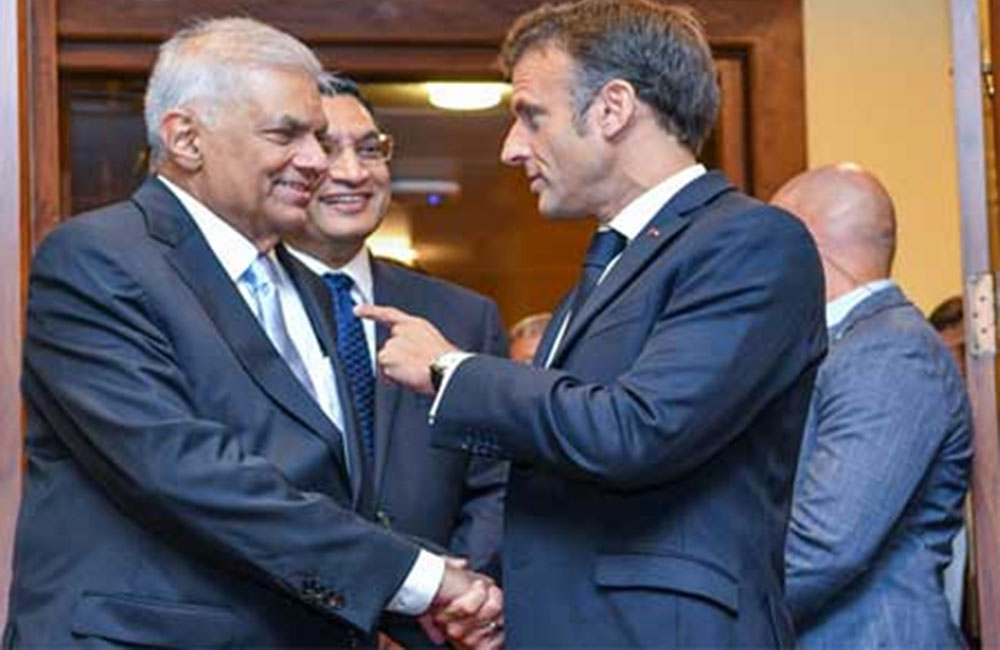
French President assures support to SL's debt restructuring process
French President Emmanuel Macron said that the French Government is ready to provide the maximum support to complete the debt restructuring process in Sri Lanka as well as encourage all other partners to expidite the debt restructuring process.
He stated this when he arrived in Sri Lanka on Friday night.
The French delegation, including the French president, arrived at the Katunayake Airport, in three planes of the French government, at around 11.35 pm on Friday.
The French President arrived in Sri Lanka after the his visit to Papua, New Guinea.
A group including President Ranil Wickremasinghe and Minister of Foreign Affairs Ali Sabry, arrived at the Bandaranaike Airport premises to welcome and hold a discussion with the French delegation.
According to the Presidential Media Division, President Ranil Wickremesinghe and President Macron held a friendly and productive bilateral discussions to enhance and elevate the existing relations between Sri Lanka and France.
Attention has been given to improve the relations between the two countries in specific fields.
These fields include, establishing an educational institute to develop maritime safety and security, the establishment of a French agency for development in Sri Lanka, initiating high - level diplomatic dialogue, improving the cooperation in the field of education and improving efforts to curtail human trafficking in the ocean.
Minister for Europe and Foreign Affairs of France, Catherine Colonna, Minister of State for foreign affairs Philippe Vigier and Jean-François Pactet, Ambassador of France to Sri Lanka and the Maldives, were among the delegation that visited Sri Lanka.
In a tweet the French President revealed that he was working to begin a new era for the partnership between Sri Lanka and France and thereby strengthen the 75-year diplomatic relations between the countries.
The French President and the delegation remained at the airport terminal for about 2 hours and then departed for Paris at 01:44 AM.
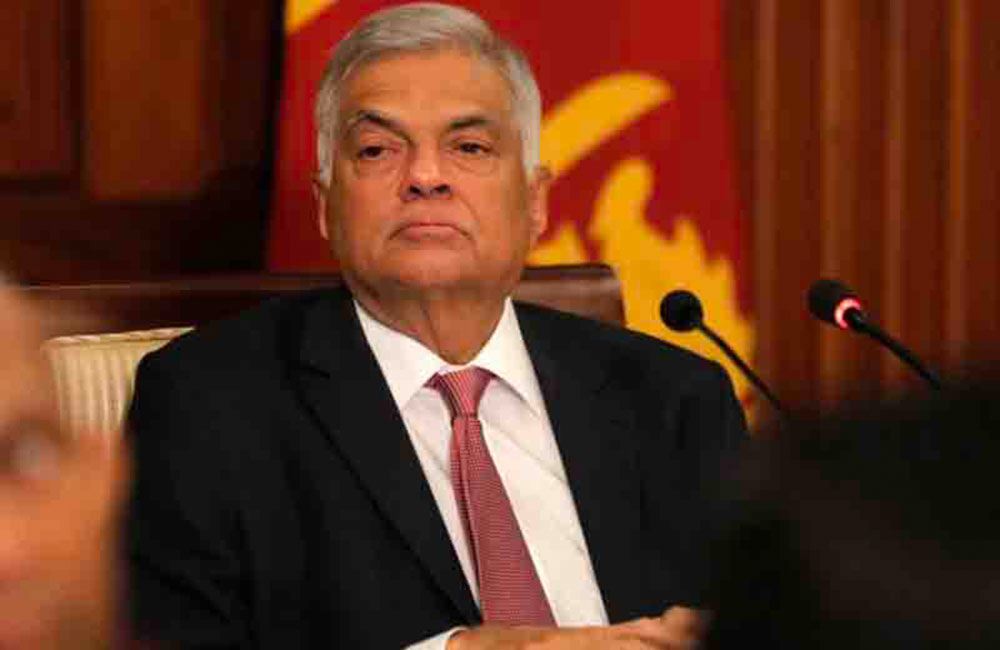
Ministries : Slight change for institutions under several ministries
President Ranil Wickremesinghe has issued a special gazette notification, amending the portfolios of several ministries.
Sahasya Investment Ltd. and the National Equipment and Machinery Organization are now under the purview of the Minister of Finance, Economic Stabilization & National Policies, having previously been under the Ministry of Transport & Highways and the Ministry of Urban Development & Housing, respectively.
The cultivation of maize for animal feed within the country will now fall under the responsibility of the Minister of Agriculture, while the Minister of Plantation Industries will no longer oversee the cultivation of maize required for Thriposha production and animal feed. The changes were dated Monday, July 31.
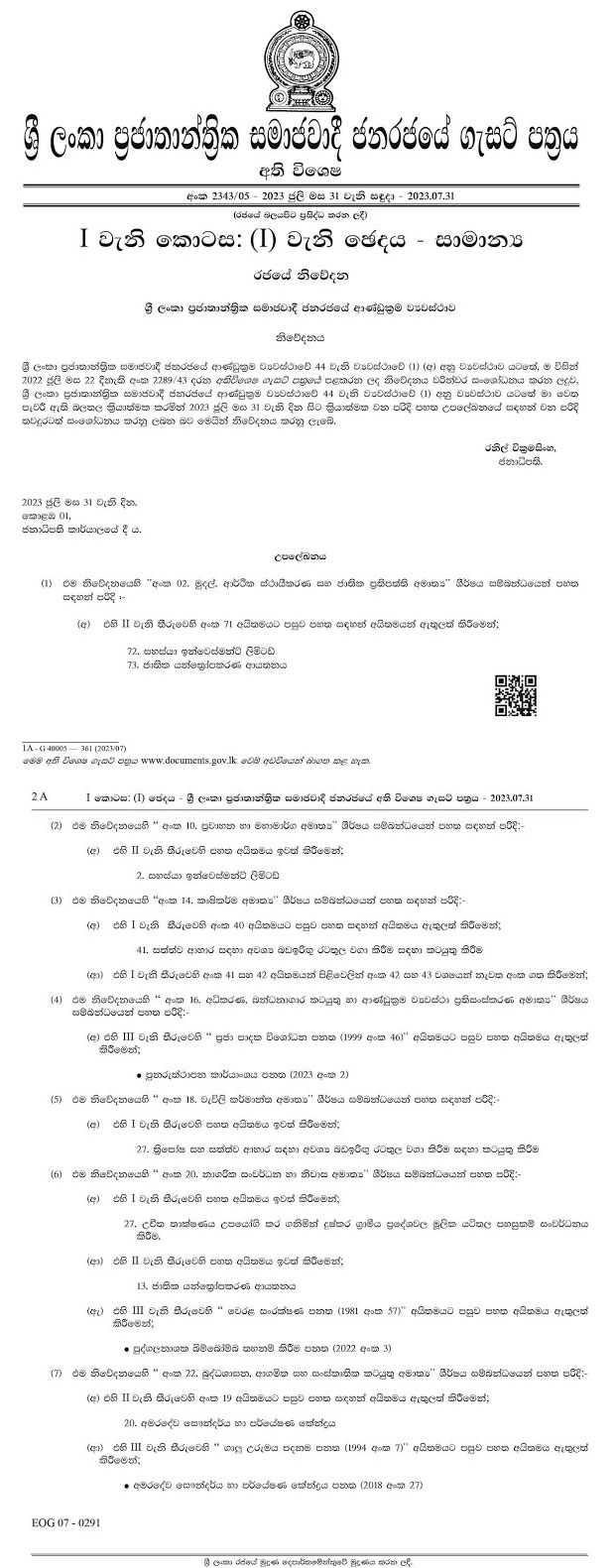
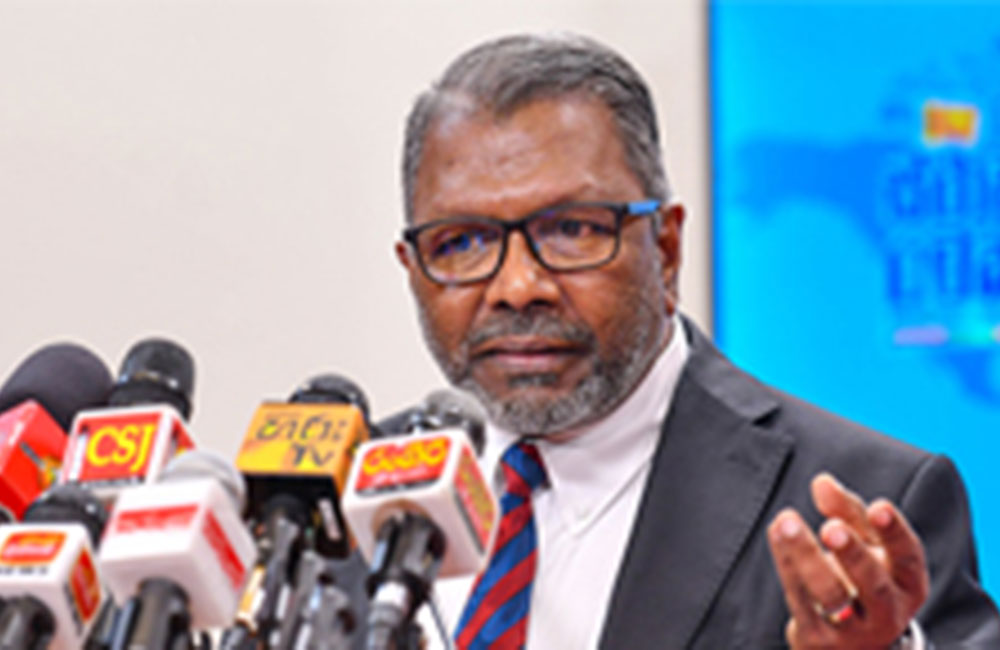
Raghavan says President’s decision on 13A a positive, optimistic step for country’s future
State Minister of Higher Education, Suren Raghavan, says President Ranil Wickremesinghe’s proposal to implement the 13th Amendment of the Constitution without police powers as a measure to foster national harmony may not be popular, but it is a forward-looking decision for the future of the country.
Additionally, Minister Raghavan, highlighted that this decision was taken despite the considerable risk involved, in order to pave the way for a new political journey anticipated by the young people who have been actively engaged in the ‘Aragalaya’.
He conveyed these perspectives while addressing a Press briefing themed ‘Collective Path to a Stable Country’ at the Presidential Media Centre (PMC) yesterday (July 28).
During his remarks, the state minister asserted that a national dialogue has once again emerged regarding the 13th Amendment of the Constitution. He clarified misconceptions about the current president’s approach to this matter, emphasizing that all former presidents have previously discussed the issue. He pointed out that the country is now transitioning into a post-war phase.
Raghavan made it clear that while he does not consider himself a participant in any on-going struggle, the essence of the struggle is evident. He stressed the significance of renewing the agreement between the citizens and the state, a sentiment echoed by the people of the country and the younger generation poised to shape its future. Emphasizing the state’s responsibility, he underscored the need to address the aspirations and social needs of all citizens in order to revitalize the nation.
“At present, President Ranil Wickremesinghe’s actions may not be widely supported, as it is a known fact that elections are on the horizon. Typically, popular decisions are made during such times to garner public favour.” State Minister of Higher Education, Mr. Suren Raghavan, suggested that providing essential necessities like free bread, dal, gas, and electricity, or making promises to do so, could be a favourable approach during this period.
Despite the potential risks involved, President Ranil Wickremesinghe has shown boldness in initiating this discourse during his political tenure. It is evident that the President holds a deep belief in democracy and firmly believes that even if a decision is not popular, it must be the right thing to do. The President embarked on this task with the hope of resolving the issue without burdening future generations.
During a discussion with party leaders and opposition ministers in parliament, President Ranil Wickremesinghe raised the question of whether they support the 13th Constitutional Amendment. It was pointed out that this amendment has been a part of the constitution for several decades, and significant funds, around Rs. 300 billion per year, are allocated to the Northern Provincial Council alone. This has led to a crucial question regarding the meaningfulness of maintaining the provincial council at such a substantial financial cost.
Furthermore, the President made it clear that if the 13th Amendment is not accepted politically, Parliament should step in and take action to abolish it. The Tamil political elite also face internal disunity, with varying opinions and stances on the matter. Some members are abstaining from the discussion and refuse to accept any solution that does not involve federalism. On the other hand, when others request a solution, they do not actively work towards finding one. This lack of consensus and commitment from certain factions within the Tamil political elite poses a challenge to the nation’s progress on this issue.
In light of the situation, adopting a dialogical democracy appears to be the most suitable approach. The enforcement of the 13th Constitutional Amendment, as proposed, should not be further delayed. Moreover, some parties advocate for 13+, as discussed with Mr. Mahinda Rajapaksa, and given the prolonged postponement of provincial council elections for nearly seven years, resolving the underlying issues is essential before holding the election.
One critical matter raised is whether all the powers outlined in the 13th Constitutional Amendment will be granted. Specifically, there is an on-going discussion regarding the granting of police powers. While the amendment mentions police powers, it has not been implemented due to mutual suspicions. Hence, there is a pressing need for a constructive dialogue to establish a new consensus between the state and its citizens, particularly concerning the Tamil people.
‘As a former governor, I have observed that 95% of the Tamil-speaking population faces daily struggles for survival, encompassing essential aspects like access to clean drinking water, healthcare, education, transportation, security, and economic opportunities. It is imperative to address these challenges promptly’.
It is equally important not to exploit the existing differences among Tamil leaders for political gains. Instead, we must focus on genuine efforts to win the hearts of the Tamil people and foster a unified approach towards building a prosperous and inclusive future for all citizens.
--PMD
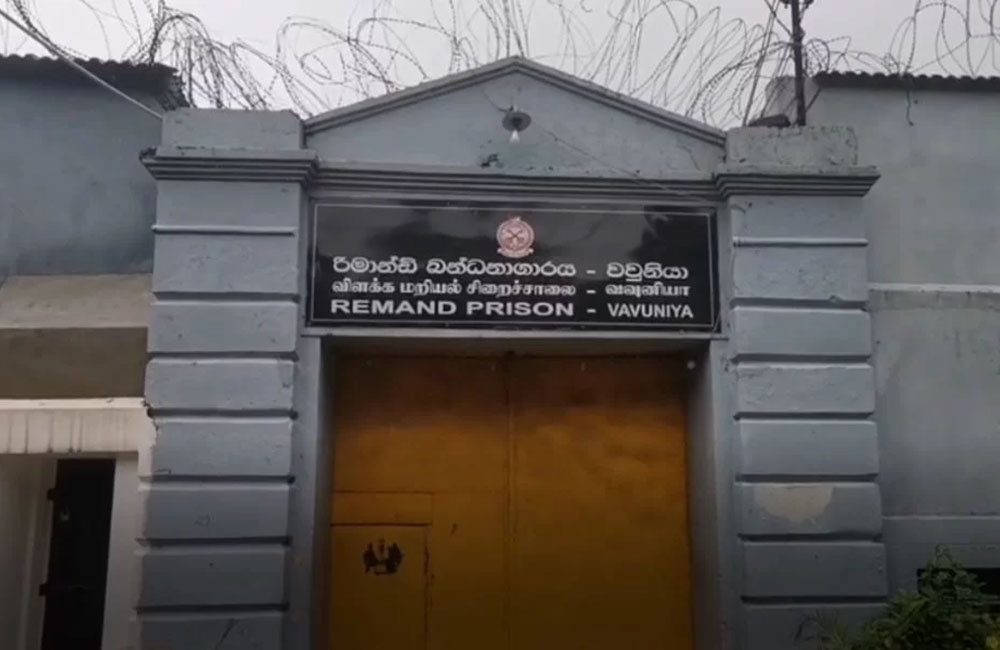
Vavuniya Prison temporarily closed
The Vavuniya Prison was temporarily closed after four inmates were diagnosed with measles.
Prisons Spokesperson and Administrative Chandana Ekanayake speaking to News 1st said that inmates are not allowed to meet with relatives, and visitation opportunities have been suspended.
He added that the process of moving prisoners for court cases was also suspended.
The Prisons Commissioner said the decision was reached in order to prevent an outbreak in the Vavuniya Prison, which houses over 400 inmates.
He said the premises will be off limits until the 8th of August 2023.
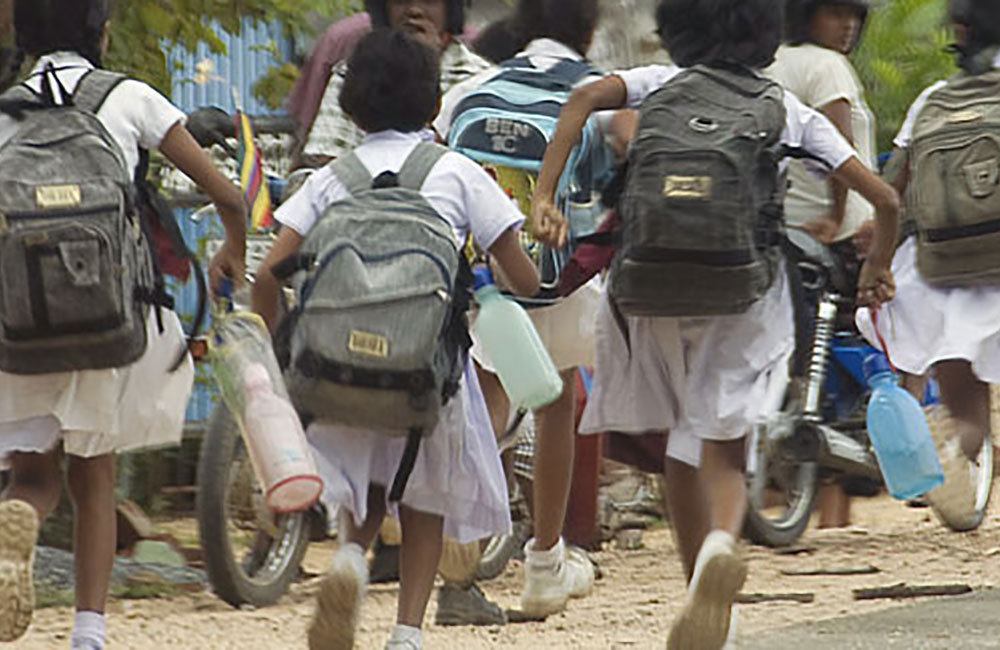
New school term for 2024 : Update from Education Ministry
The Ministry of Education has issued a circular announcing the commencement date of the new school term for the year 2024.
The circular issued by Education Minister Susil Premajayantha states the new school term for the year 2024 will commence on February 21, 2024.
The second academic term of 2023 for government and government-approved private schools is currently underway after having commenced on July 24, 2023
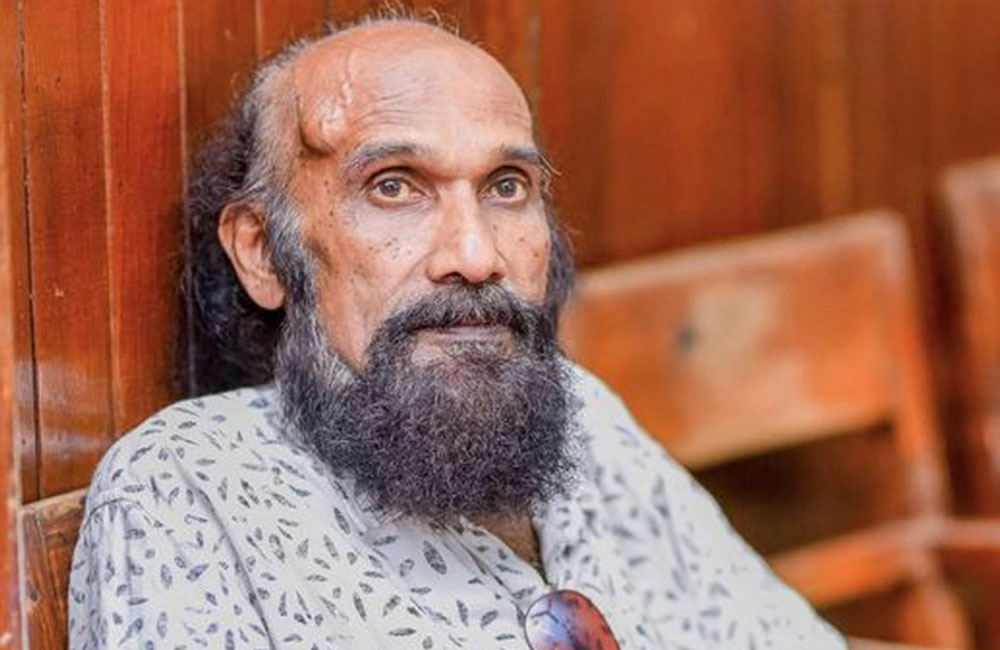
Veteran journalist Lal Sarath Kumara passes away
Veteran journalist, actor and dubbing artiste Lal Sarath Kumara has passed away aged 69.
He had suddenly fallen ill this morning (01) and died, reports said.
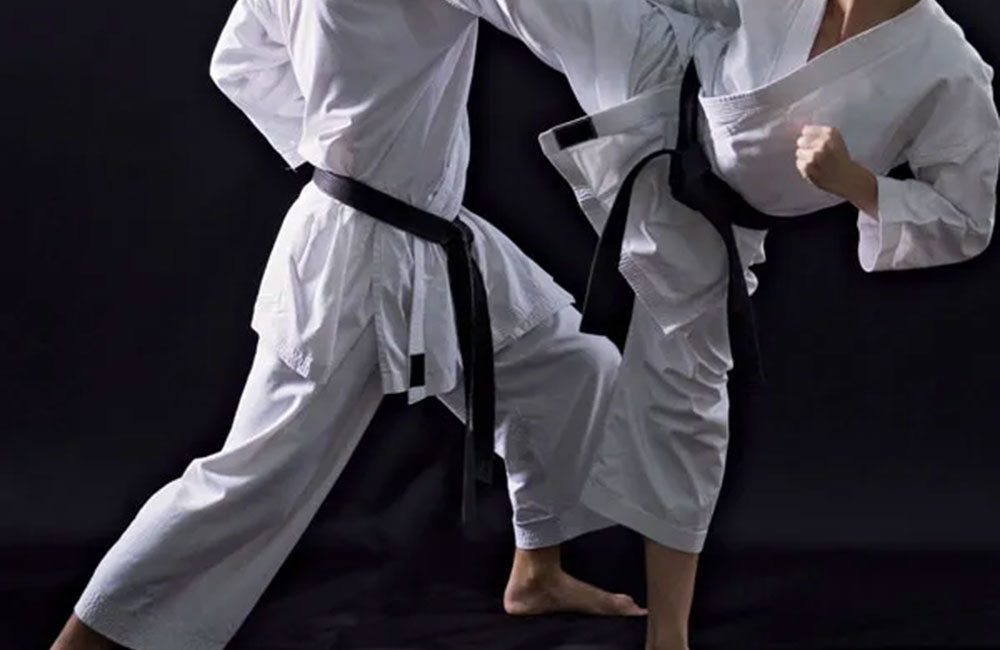
Sports Minister suspends registration of SL Karate-Do Federation
A new Gazette notification has been issued suspending the registration of the Sri Lanka Karate-Do Federation, which is the National Association for the Sport of Karate-Do.
The Gazette notification has been issued by the Minister of Sports Rohan Ranasinghe dated July 28, 2023.
As per the Gazette, the Sports Minister has appointed a 09-member committee for a temporary operational procedure in order to further maintain the functions of the said association.
The committee is headed by C. A. G. De Zoysa, while Dr. Jayalath Illangakoon has been appointed as the Secretary.
S. C. Medawatta, Dr. Jayanthi A. Nanayakkara, Mahilini Maiyuran, K. M. C. Kumara, R. Deva Kumara, A. K. Shiromi Fonseka, and A. R. M. Iqbal are the remaining members of the committee.
The committee has also been vested with powers to appoint an election committee to call and conduct the election of office bearers under the supervision of the Director General of the Department of Sports Development.

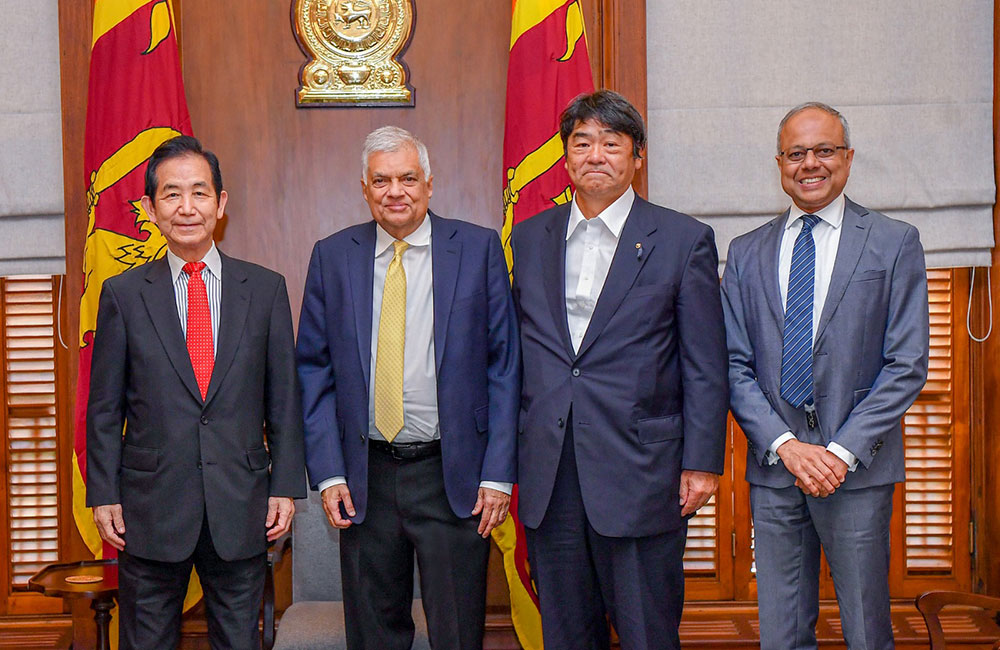
Japanese delegation and President discuss resuming stalled development projects
Japan’s Minister of State in the Cabinet Office, Mr. Satoshi Fujimaru and former Minister of State for Regional Revitalization and Regulatory Reform, Mr. Kozo Yamamoto called on President Ranil Wickremesinghe at the Presidential Secretariat today (31).
During the meeting, they discussed the stalled development projects in Sri Lanka, which were previously supported by the Japanese Government, the President’s Media Division said.
The parties agreed to restart these projects once the credit optimization process in Sri Lanka is completed. Additionally, they decided to involve officials from the Japanese Embassy in Sri Lanka in conducting an investigation related to these projects, the statement said.
The Japanese delegation, including Mr Mizukoshi Hideaki, Ambassador of Japan to Sri Lanka, President’s Senior Advisor on National Security and Chief of Staff Mr Sagala Ratnayaka, and President’s Senior Adviser on Economic Affairs Dr. R.H.S. Samaratunga, among others, attended this event.
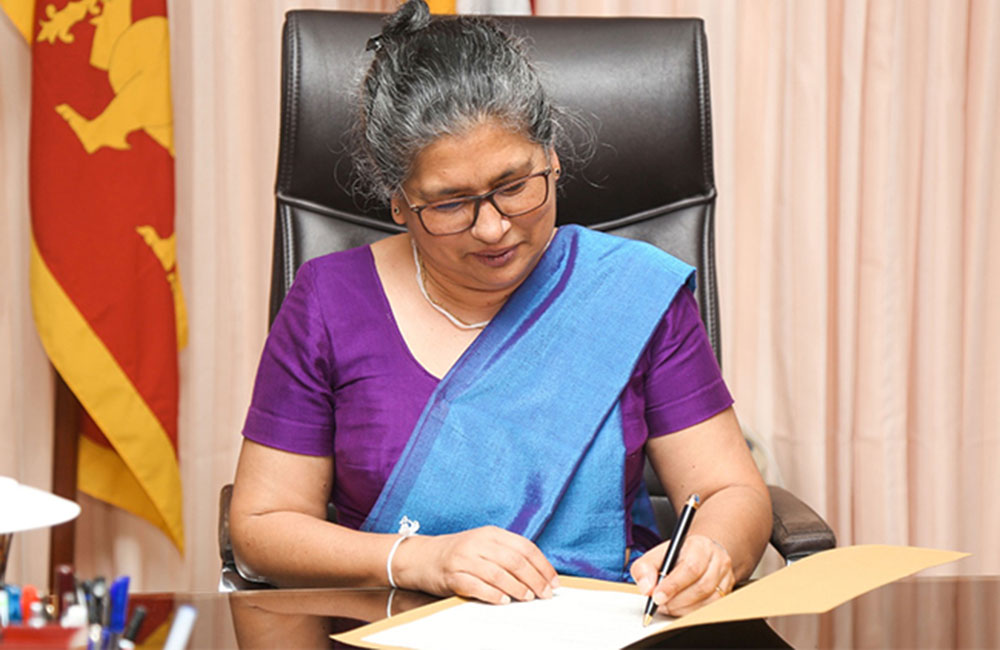
New Vice Chancellor appointed to Kelaniya University
Senior Professor Nilanthi Renuka de Silva has been appointed as the Vice Chancellor of the University of Kelaniya, the President’s Media Division (PMD) reported.
The relevant appointment was made by President Ranil Wickremesinghe, the PMD said.
Accordingly, Prof. Renuka de Silva has been appointed as the Vice Chancellor of the university for a three-year term, effective from 24 August.
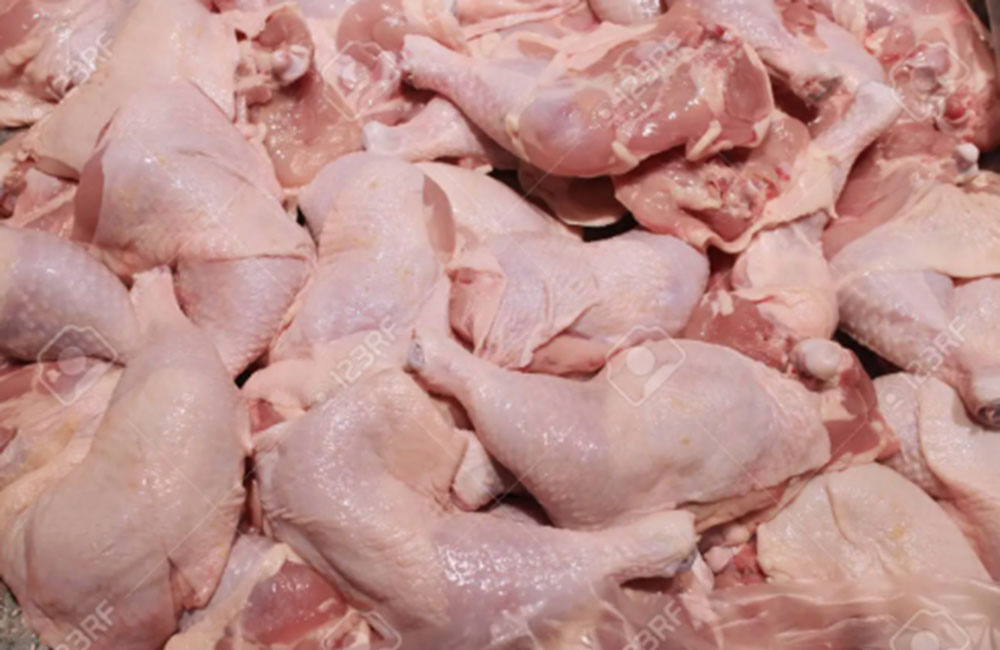
Govt approves import of chicken for food industrial purpose
Approval has been granted for the importation of chicken for food industrial purpose, Minister of Trade, Commerce and Food Security Nalin Fernando announced today.
Minister Nalin Fernando stated that approval had been granted by President Ranil Wickremesinghe.
He further stated that the decision to import chicken has been taken in order to control prices.
The Minister of Trade, Commerce and Food Security made the remarks while addressing a media briefing in Colombo today.
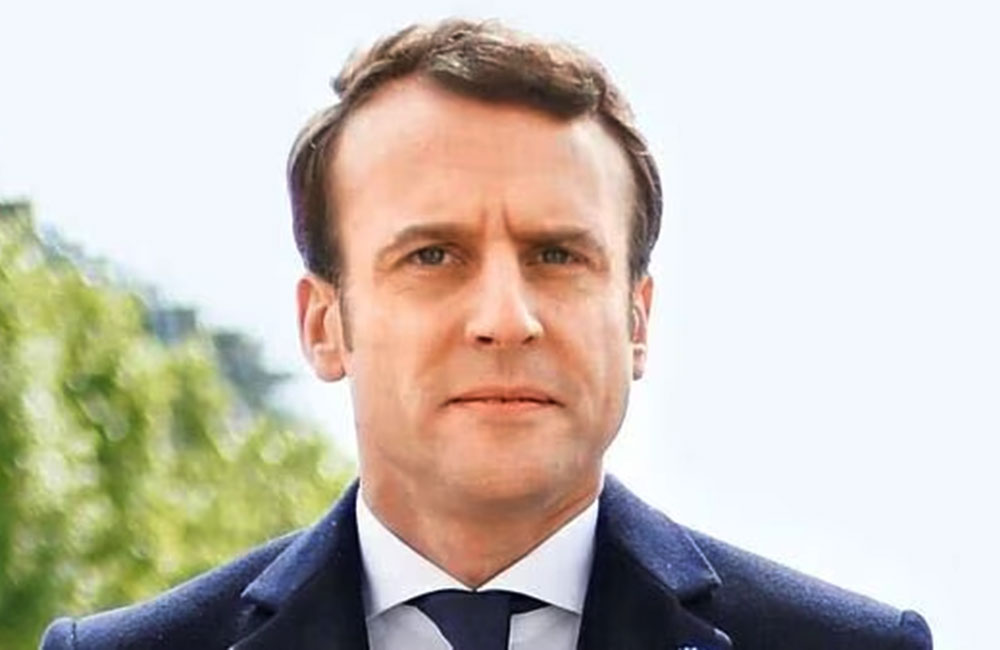
French President to visit Sri Lanka this weekend
The President of France Emmanuel Macron will visit Sri Lanka on his return from Papua New Guinea, on Friday (28) night to Saturday (29) morning, reported French Media.
Reports said that the French President will meet with Sri Lankan President Ranil Wickremesinghe during his brief stay.
This historic visit is the first by a French president to Sri Lanka.
The visit had not been announced in advance by the Presidency of the Republic. The Head of State must first travel to Vanuatu on Thursday (27) before going to Papua New Guinea, for visits there also historic since it is the first trip of a French president to countries Pacific Independents.
France is part of the group countries that a announced a common platform for talks among bilateral creditors to coordinate restructuring of Sri Lanka's debt.
The other countries in the group are Japan, and India.
Page 235 of 660